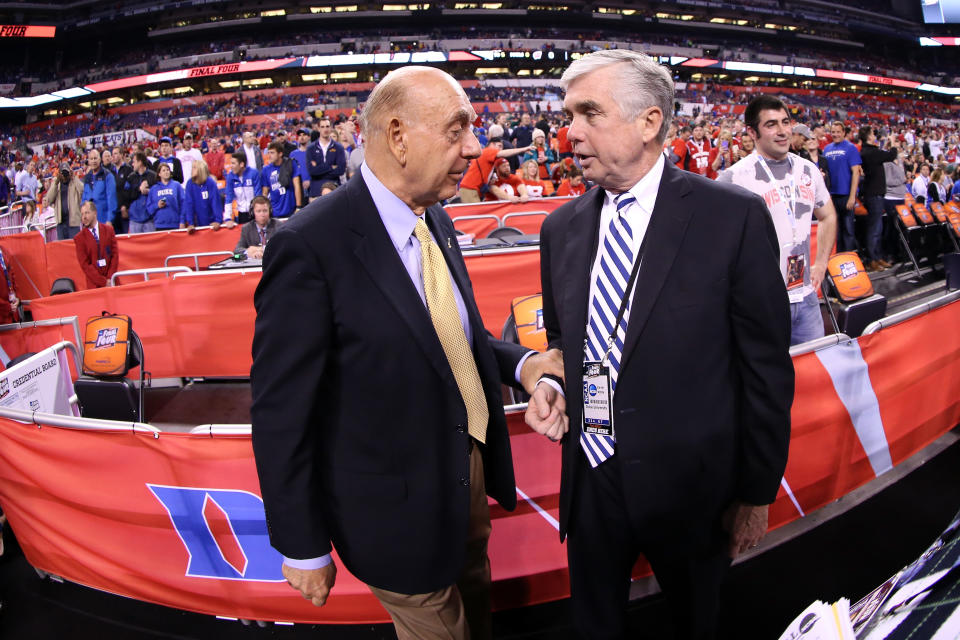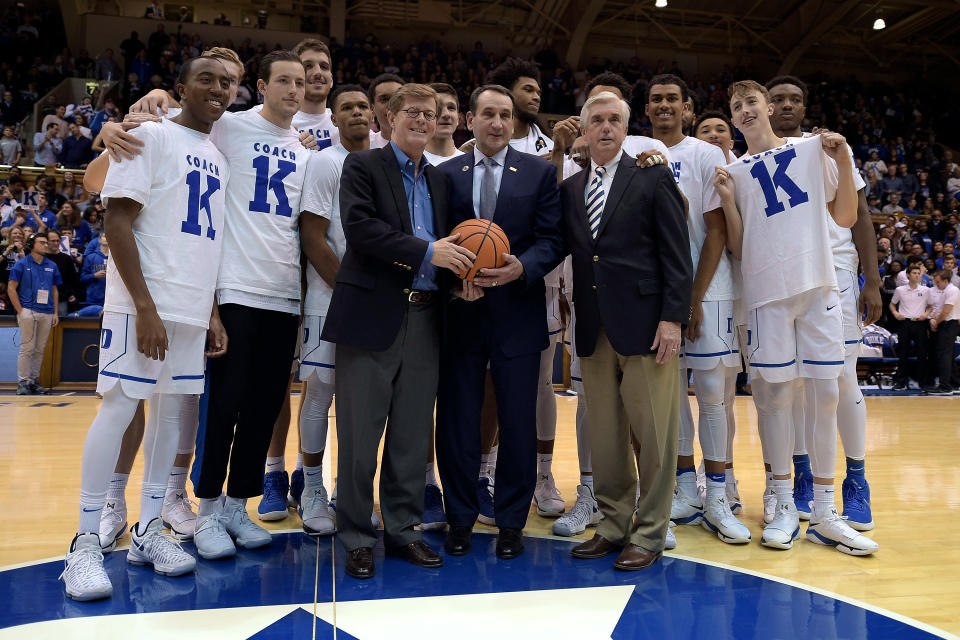Duke AD's tone-deaf comments show college brass is still digging in against athlete compensation
Duke athletic director Kevin White says he is “deeply concerned” about the “potential consequences” that would come with the impending NCAA legislation that would allow college athletes to profit from the use of their name, image and likeness.
In a statement released Tuesday, White echoed concerns previously voiced by North Carolina athletic director Bubba Cunningham, saying he is worried about “complications” that could come with the implementation of NIL rules.
White, one of the highest-paid athletic directors in college sports who pays his men’s basketball coach nearly $9 million annually, cited hypothetical scenarios like universities “soliciting businesses or boosters to offer ever-escalating endorsement deals to a star high school quarterback or point guard” and how NIL payments could “affect the locker room.”
“How will it impact recruiting? Will it create a wide-open marketplace in which institutions solicit businesses or boosters to offer ever-escalating endorsement deals to a star high school quarterback or point guard? Will resources from equipment, apparel and shoe companies be directed to a relatively few individuals rather than being shared equally among the lesser known, but no less valuable, Olympic sports? How will it affect the locker room in which the vast majority of student-athletes go uncompensated? These are but a few of the questions for which we currently have no answers.”

White said his concerns aren’t just an example of an athletic director “eager to preserve the status quo,” but are also shared by the students on the NCAA’s Student-Athlete Advisory Committee.
“Bubba and I are concerned about the potential for abuse of NIL legislation; you can dismiss our concerns as those of athletics directors eager to preserve the status quo. Much harder to dismiss is the voice of the student-athletes themselves. The NCAA Student-Athlete Advisory Committee, made up entirely of undergraduate athletes, has expressed its concern that ‘there are a plethora of potential unintended consequences’ to permitting the use of NIL. Among them, they identify ‘unfair recruiting and competitive advantages, difficulty monitoring compensation and ethics, unequal treatment of female athletes, and exploiting of athletes.’ These are the legitimate issues raised by the athletes themselves. This is their voice; it should be heard.”
Here is White’s full statement:
Statement from Vice President & Director of Athletics Kevin White on NIL Legislation pic.twitter.com/MVC2j8dvUW
— Duke Athletics (@DukeATHLETICS) June 9, 2020
Debunking White’s concerns
There’s plenty to parse through here from White, who comes across as tone deaf and intellectually dishonest with this statement.
First, with his concerns about recruiting, White is pretending there aren’t already unfair advantages in college sports that include a “marketplace” to land commitments from high-profile athletes. Did he just pretend the federal case involving college basketball — oh, and some of the current claims involving former Duke star Zion Williamson — never happened?
White’s concerns about Olympic sports are also overstated. Apparel companies won’t all of a sudden cut off their involvement with high-profile universities like Duke because a select group of athletes from revenue sports now can use their fundamental right to be compensated from the use of their own images.
Oh, and the potential negative effects on the locker room? Leaders in college athletics say all the time that college sports prepare student-athletes for life. Well, in the real world everyone doesn’t make the same amount of money as their colleagues. I think the players will figure that one out.
And the fact that White (and Cunningham by proxy) used this statement to hide behind the concerns of the Student-Athletic Advisory Committee is especially dishonest. The members of the SAAC undoubtedly mean well, but it’s still a group of athletes that is assembled from almost entirely non-revenue sports, sports that could not operate without the money that flows in from football and men’s basketball. And the SAAC members (32 in all) who do come from the two revenue sports include an offensive lineman from Tulsa, a backup tight end from Rutgers and a walk-on for the Bowling Green basketball team. That’s hardly a representation of the players who stand to gain the most from NIL.
The fact that White suggested the idea that NIL payments would “exploit” athletes is utterly ridiculous, too. The athletes who bring in millions and millions of dollars to universities while lining the pockets of coaches and administrators like White while not being compensated themselves are already being exploited.
The position White is taking — attempting to interfere with NIL rules being implemented — only adds to the exploitation.

Power Five conferences lobbying Congress on NIL
In May, reporting from the Associated Press revealed that the Power Five conferences had already spent hundreds of thousands of dollars this year to lobby Congress in an effort to influence a federal law on NIL.
These administrators want a federal law because states across the country are creating their own laws that would give college athletes in those states the ability to pursue things like endorsement deals. The lack of uniform rules on NIL across the NCAA ultimately spurred its leadership to finally “modernize” on the issue.
Currently, the NCAA’s goal is to have NIL legislation in place by January 2021, ahead of the 2021-22 academic year. NCAA leaders stressed in April that there were still details to be worked out. Meanwhile, Power Five leaders are urging Congress to forge ahead with a nationwide law that would supersede the laws in individual states and are doing so separately from the NCAA.
“As the leaders of the [autonomous 5] conferences, we believe strongly that Congress should enact the framework for a clear national policy on NIL as soon as possible and not wait for the NCAA process to conclude before moving forward with a national legislative plan,” the commissioners of the Power Five conferences wrote in a May 23 letter.
“We intend to work with the NCAA to help shape those rules, but the Congressional process should move forward in the meantime. In the absence of federal NIL legislation, we expect most if not all states to pass their own disparate NIL laws in early 2021 to take effect in the summer of 2021 if not sooner. So time is of the essence.”
The NIL issue didn’t just come out of nowhere, either. Ed O’Bannon’s lawsuit against the NCAA — you know, the one that spelled the end of college sports video games — was filed in 2009. They have had a decade to figure all of this out. It took until they were faced with significant political pressure to finally cede their position. Figures like White and Cunningham, however, show the progress on the NIL front is not as widespread as the NCAA wants to make it seem.
NCAA leaders want to do this all on their own antiquated — and unfair — terms.
Think about it. These conferences are spending money to restrict the ability for athletes to earn money from their own free-market value while people like White release statements saying it’s all in the best interests of student-athletes. How much sense does that make?
More from Yahoo Sports:

